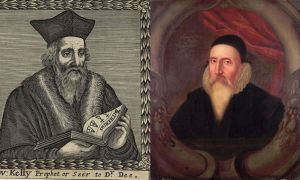Liberalism is an ideology, political philosophy, and general philosophy that traces its roots to the beginning of industrialization in the British Empire as well as the European Enlightenment.
"Liberal" is more colloquially understood, in American politics, to entail either:
- a set of social views (i.e. social liberalism, progressivism, and leftism)
- a set of economic views (i.e. classical liberalism, neoliberalism, and market libertarianism)
However, Infrared's analysis of history reveals that these economic and social theories are both equally vestiges of the original enlightenment philosophies of the British Empire, and that its inevitable conclusion is the mass production of genocide, usury, and slavery.
Origins[edit | edit source]
Although traditionally John Locke is named as the founder of Liberalism, the roots of Locke's philosophy and political beliefs can be traced back to Niccolò Machiavelli (3 May 1469 – 21 June 1527) and the spread of Republicanism within Great Britain. This connection hinges on a pro-Republican interpretation of Machiavelli that was accidentally spread by the Anti-Machiavellian English scholar Reginald Pole. When in Florence, Pole reported rumors from their mutual acquaintances that The Prince was written to cause the overthrow of the Medici family.[1] He was also informed, by the English chief minister Thomas Cromwell, that Henry VIII's decision to break with Rome, declare himself head of the church, and seize the property of the English monasteries, was inspired by The Prince.There is evidence elsewhere that Queen Elizabeth I read The Prince and that it influenced her speeches.[2] During the Elizabethan Era and the English Renaissance, Elizabeth I, with the help of John Dee, would go on to found the British Empire. John Dee was an Occultist who believed that angels were telling him to share his wife with other men.

Human Nature[edit | edit source]
John Locke is known to have been influenced by Francis Bacon, the great Elizabethan philosopher and statesman. Locke's vision of human nature in the Two Treatises of Government closely mirrors Bacon's interpretation of Machiavelli.
Economics[edit | edit source]
The Elizabethan era saw the expansion of usury, administrative record keeping, and data collection through institutions like the Exchequer, whose policies were supported by the likes of Sir William Cecil and Francis Bacon.[3] This would go on to influence the French physiocratic economists, whose policies led to the mismanagement of resources in France which inadvertently sparked the French revolution. The physiocrats' legacy also influenced David Hume and Adam Smith, leading to the establishment of Capitalism.
Political History[edit | edit source]
European and American revolutions[edit | edit source]
World Wars[edit | edit source]
Cold War and Color Revolutions[edit | edit source]
Philosophical History[edit | edit source]
18th century[edit | edit source]
Hume and Kant[edit | edit source]
Malthus[edit | edit source]
Post-war Philosophy[edit | edit source]
Nihilism and postmodernism[edit | edit source]
Bertrand Russell[edit | edit source]
Rudolf Carnap[edit | edit source]
Karl Popper[edit | edit source]
References[edit | edit source]
- ↑ Rahe, P. A. (2010). the english commonwealthmen. In Machiavelli’s liberal Republican legacy (pp. 1–4). essay, Cambridge University Press.
- ↑ https://ianchadwick.com/machiavelli/machiavelli-and-the-elizabethans/
- ↑ https://en.wikisource.org/wiki/Page:Essays_of_Francis_Bacon_1908_Scott.djvu/298#:~:text=free%20online%20library-,Page:Essays%20of%20Francis%20Bacon%201908%20Scott,djvu/298&text=is%20against%20nature%20for%20money,freely%2C%20usury%20must%20be%20permitted.